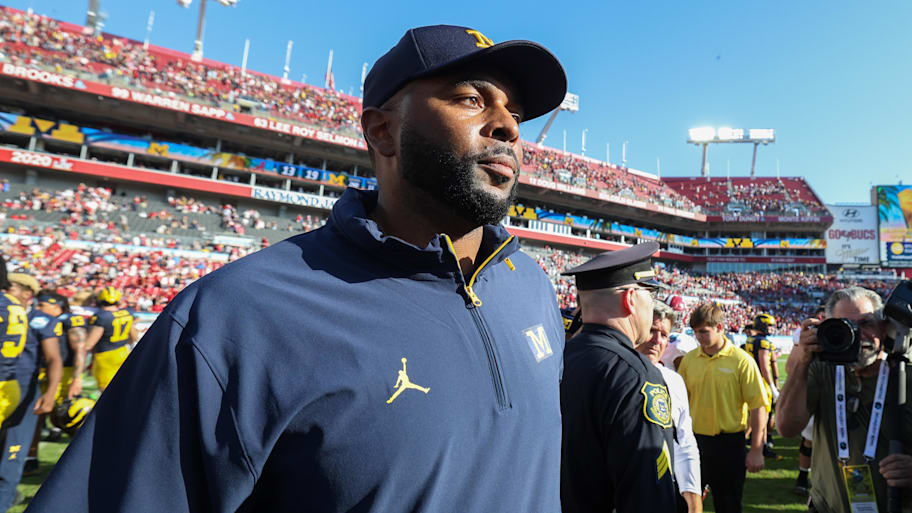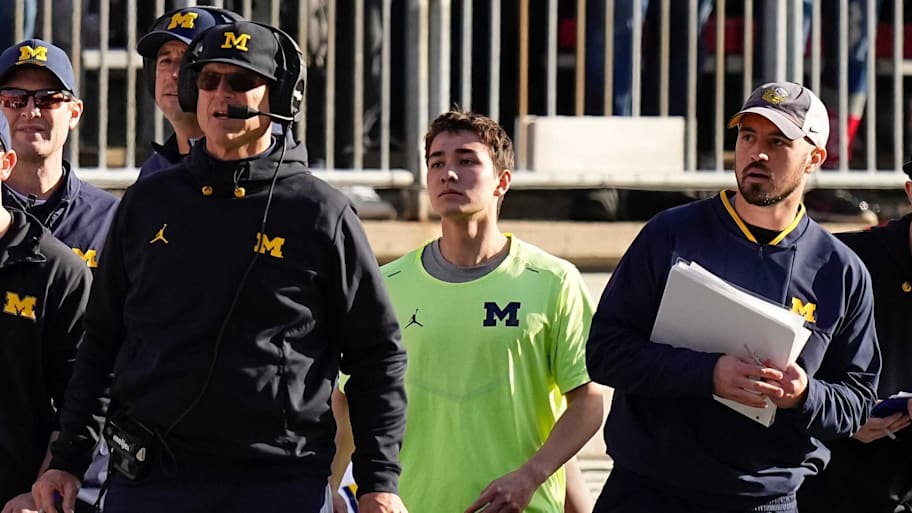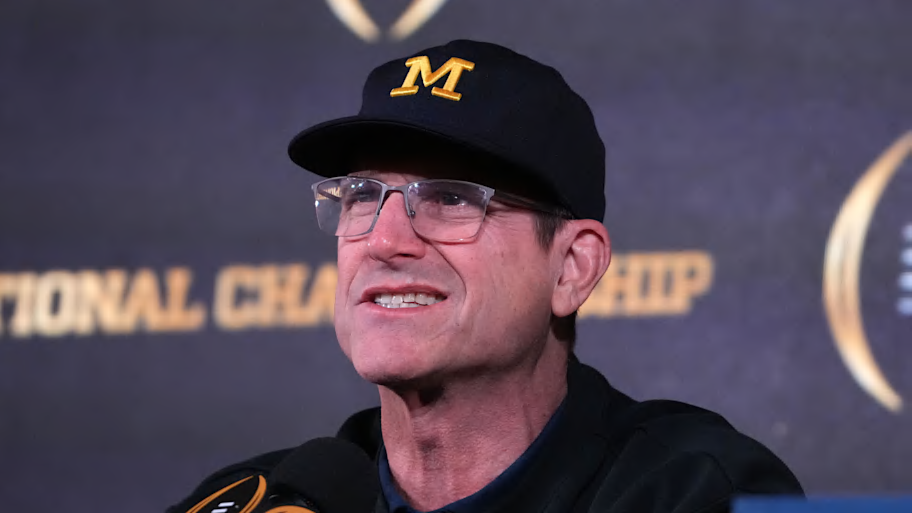“Hard to beat the cheaters.” — Jim Harbaugh to author John U. Bacon, as published in Bacon’s 2019 book on Michigan football.
Friday, six years and a national championship removed from his time looking down on the rule breakers in college football, Harbaugh officially became one of the most-penalized cheaters in the sport’s history. The NCAA Committee on Infractions ruled that Harbaugh committed major rules violations and delivered a 10-year show-cause penalty to the former coach of the Wolverines in the Connor Stalions affair, one of the more bizarre capers in college football annals.
But that 10-year sanction doesn’t even take effect until after Harbaugh’s current four-year show-cause penalty expires for a different set of rules violations. Thus Harbaugh is facing show-cause rulings that would make him difficult to hire as a college coach prior to Aug. 7, 2038. Jeremy Pruitt, Kelvin Sampson and Bruce Pearl look like Ivy Leaguers compared to Harbs.
“Harbaugh ran a program that was largely dismissive of rules compliance,” the COI infractions report stated. “There was little, if any, emphasis on following the rules. To the contrary, his program saw compliance as the enemy, made their own decisions regarding interpreting rules to their benefit, or outright committed rules violations.”
If you can’t beat the cheaters, join ’em. Then beat ’em. Then beat the posse out of town. That’s the final notation on the career arc of Jim Harbaugh at Michigan, a smug school that cannot consider itself more athletically principled than its competitors.
This is a stain on the legacy of a man and a program that care about such things. It also means nothing in terms of impacting the 2023 national title or the record books. Harbaugh left for the Los Angeles Chargers after winning that natty and is now chasing a Super Bowl ring that would make him one of the most accomplished coaches in history.
He has no need—and, one would assume, no desire—to return to college football. His work at that level, aided by cloak-and-dagger fanboy spymaster Stalions, is done.
In today’s shame-optional sports universe, where no apologies are necessary for anything but losing, Friday was a win for Michigan. It’s a damn expensive win, with the school facing a record fine in the $30 million range—“real money,” as one prominent college administrator put it to me—but there is always more of that to shake free at schools like Michigan. The Wolverines avoided the worst of it.
There is no postseason ban looming to ruin this season—those are out of vogue in the kinder, gentler NCAA, where even repeat violators remain eligible to chase championships. There is no vacating of victories from the three playoff seasons from 2021 to ’23, because there are no ineligible players involved in impermissible advance scouting. There are no scholarship reductions, and even the recruiting restrictions that were applied are easily surmountable.

One of the few areas where the COI could hit Michigan where it hurts is in sanctioning current head coach Sherrone Moore, who committed Level II violations and is a repeat violator himself. But Moore’s penalties were delivered with a velvet hammer—a single game suspension added in 2026 to the two he will serve this year. Michigan even got to hand-select which games he will miss this season (Central Michigan and Nebraska, the third and fourth on the schedule, which makes no sense). And the rationale for adding the third game next year, as opposed to this year, went unexplained on a Committee on Infractions media call Friday afternoon.
How’s this for a footnote in history: Michigan will now play in three different seasons across a four-year period with suspended head coaches. Harbaugh sat out six games in 2023; Moore will miss two this year; and now one more next year.
So ends another chapter in the NCAA’s chronic inability to find a punishment that fits a crime. The same plot line tends to play out—an initial splash of scandal, a school (and its fans) proclaiming innocence, the NCAA saying nothing, misinformation and misunderstanding flourishing, the entire process going underground for months, many of the implicated parties fleeing college sports, then a resolution that often fails to find the bull’s-eye. In years past, the association has occasionally over-penalized. In more recent times, it has under-penalized—especially when it foolishly turned over investigations and rulings to a new, know-nothing process known as the IARP. (That died a merciful death a couple years ago.)
What the NCAA did accomplish in this case was to create a compelling account of exactly how devious Stalions was, and his ability to advance himself within Harbaugh’s “Just Win, Baby” program. The backstory is even more absurd than expected.
The Naval Academy graduate attached himself to the Michigan program and made himself valuable as a sign stealer, something that is legal during games but is now an anachronism. Plays are sent in via helmet communication instead of hand signals, an advancement that could accurately be called the Connor Stalions Rule.
During games, Stalions was positioned on the sidelines during games next to the Wolverines’ coordinators. It’s not the kind of place you find normal low-level staffers with unimportant jobs. But that was the legal stuff—the scheme behind the impermissible rule breaking was laid out in the COI report.
Stalions, the NCAA says, employed a network of individuals to perform advance, in-person scouting 56 times at 52 different games, recording the signals of future opponents on their phones. Stalions referred to the group as the “KGB” and their work as “counterintelligence.” Their recordings, which he used to decipher play calls, was “dirty film.”
Could you be a little more theatrical, dude?

Stalions spent a ton of money on the scheme—roughly $35,000 on game tickets in 2022. Stalions said he paid for the tickets himself, which the NCAA did not believe but—crucially—could not confirm who might have.
COI chief hearing officer Norman Bay said Friday that members of the “KGB” group told investigators that Stalions’s scheme was being funded by someone else, “but we do not know where the money came from.”
Nor, ultimately, was the NCAA able to get its hands on the most critical sources of information—Stalions’s personal phone and stored video shot by KGB members. Stalions told Michigan compliance workers that his phone was “shattered in 1,000 pieces under a pond,” and, “My film is in the bottom of the pond.” Which would make the term “pond scum” quite applicable to Stalions.
None of this would qualify as what the NCAA likes to term “exemplary cooperation.” Which makes it even more precious that he showed up in Indianapolis in June for the Committee on Infractions hearing. The man does love the drama.
In the end, stonewalling Michigan compliance and NCAA Enforcement helped earn Stalions an eight-year show-cause order. “In short, Stalions’s multiple and repeated failures to cooperate are some of the worst the COI has ever seen,” the NCAA report stated.
And yet, Harbaugh got a longer show-cause. That hints at what the Committee on Infractions thought about its dealings with him across two different investigations.
Harbaugh is a forever hero to Michigan fans because he delivered the only things most of them care about—a national championship and victories over Ohio State. But his positioning early in his tenure at the school as a forthright rule abider who operated above the muck of the sport is gone for good. He employed an obsessive cheat who spent a lot of money in pursuit of a significant competitive advantage. What looks even worse, he also employed Matt Weiss.
As he said, it’s hard to beat the cheaters. So Jim Harbaugh got down and dirty in his own way. His ring and rap sheet both are part of Michigan lore now.
More College Football on Sports Illustrated
This article was originally published on www.si.com as NCAA Hammers Michigan, Making Jim Harbaugh Most-Penalized Cheater in Sport’s History.
